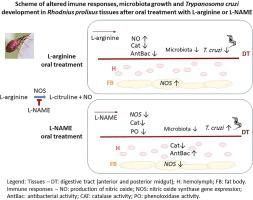Journal of Insect Physiology ( IF 2.3 ) Pub Date : 2020-08-18 , DOI: 10.1016/j.jinsphys.2020.104100 Kate Katherine da Silva Batista 1 , Cecília Stahl Vieira 1 , Emmanuelle Batista Florentino 1 , Karina Francine Bravo Caruso 1 , Paula Thais Pinheiro Teixeira 1 , Caroline da Silva Moraes 1 , Fernando Ariel Genta 2 , Patrícia de Azambuja 3 , Daniele Pereira de Castro 2

|
The immune system of Rhodnius prolixus comprehends the synthesis of different effectors that modulate the intestinal microbiota population and the life cycle of the parasite Trypanosoma cruzi inside the vector midgut. One of these immune responses is the production of reactive nitrogen species (RNS) derived by the action of nitric oxide synthase (NOS). Therefore, we investigated the effects of L-arginine, the substrate for nitric oxide (NO) production and Nω-Nitro-L-arginine methyl ester hydrochloride (L-NAME), an inhibitor of NOS, added in the insect blood meal. We analyzed the impact of these treatments on the immune responses and development of intestinal bacteria and parasites on R. prolixus nymphs. The L-arginine treatment in R. prolixus nymphs induced a higher NOS gene expression in the fat body and increased NO production, but reduced catalase and antimicrobial activities in the midgut. As expected, L-NAME treatment reduced NOS gene expression in the fat body. In addition, L-NAME treatment diminished catalase activity in the hemolymph and posterior midgut reduced phenoloxidase activity in the anterior midgut and increased the antimicrobial activity in the hemolymph. Both treatments caused a reduction in the cultivatable intestinal microbiota, especially in insects treated with L-NAME. However, T. cruzi development in the insect’s digestive tract was suppressed after L-arginine treatment and the opposite was observed with L-NAME, which resulted in higher parasite counts. Therefore, we conclude that induction and inhibition of NOS and NO production are associated with other R. prolixus humoral immune responses, such as catalase, phenoloxidase, and antibacterial activities in different insect organs. These alterations reflect on intestinal microbiota and T. cruzi development.
中文翻译:

一氧化氮可影响罗氏梭菌的免疫反应,肠道菌群和克氏锥虫的发育。
Rhodnius prolixus的免疫系统包括不同效应子的合成,这些效应子可调节肠道微生物群和载体中肠内克氏锥虫的生命周期。这些免疫应答之一是通过一氧化氮合酶(NOS)的作用而产生的活性氮物质(RNS)。因此,我们研究L-精氨酸的作用,基材为一氧化氮(NO)的生产和Ñ ω -硝基-L-精氨酸甲基酯盐酸盐(L-NAME),NOS抑制剂,在昆虫血粉加入。我们分析了这些治疗方法对R. prolixus肠道细菌和寄生虫的免疫应答和发育的影响若虫。L.精氨酸若虫R. prolixus若虫处理在脂肪体中诱导更高的NOS基因表达并增加NO产生,但降低了中肠的过氧化氢酶和抗菌活性。不出所料,L-NAME处理降低了脂肪体内NOS基因的表达。另外,L-NAME治疗减少了血淋巴和后肠中部的过氧化氢酶活性,从而降低了中肠前部中的酚氧化酶活性,并增加了血淋巴中的抗菌活性。两种处理均导致可培养的肠道菌群减少,尤其是在用L-NAME处理的昆虫中。但是,T。cruziL-精氨酸处理后,昆虫消化道的发育受到抑制,而L-NAME则观察到相反的结果,这导致了更高的寄生虫计数。因此,我们得出结论,诱导和抑制NOS和NO的产生与其他R. prolixus体液免疫反应有关,例如过氧化氢酶,酚氧化酶和不同昆虫器官中的抗菌活性。这些改变反映了肠道菌群和克鲁斯锥虫的发育。











































 京公网安备 11010802027423号
京公网安备 11010802027423号